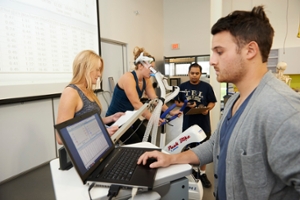Health Sciences (Doctoral program)
Overview
 The doctoral program in Health Sciences focuses on providing students with opportunities to develop the knowledge and skills required to conduct high-quality research that culminates into a PhD research thesis.
The doctoral program in Health Sciences focuses on providing students with opportunities to develop the knowledge and skills required to conduct high-quality research that culminates into a PhD research thesis. The doctoral program in Health Sciences focuses on providing students with opportunities to develop the knowledge and skills required to conduct high-quality research that culminates into a
Admissions
Admissions
Academic requirements:
- Completion of a research project or thesis-based master's-level degree in Health Sciences, Health Informatics, Kinesiology or equivalent from a recognized institution.
- Minimum B+ average (GPA: 3.3 on a 4.3 scale or 77 to 79 per cent).
Required supporting documents:
Please see the for a list of supporting documentation that must be submitted with your application.
Additional requirements:
Admission depends on the identification of a supervisor who will provide significant support (faculty member has agreed to supervise) and the applicant’s exceptional academic qualities. It is recommended that applicants contact a potential supervisor and/or the graduate program director before formally applying.
Required test scores for English language proficiency:
See for the minimum required test scores for this program.Please see for specific dates. Note that the application deadlines listed are for both the online application and all supporting documentation.
Applications for admission to all graduate studies programs are submitted online. There are five steps you must go through to complete the application process. See for step-by-step instructions.
Many of our graduate programs are extremely competitive; the number of qualified applicants normally exceeds the number of seats available for each intake. Satisfaction of minimum entry requirements does not ensure admission.
Fields
Graduate training focuses on research conducted in one of three key areas in the Health Sciences:
- Community, Public and Population Health
- Health Informatics
- Kinesiology
-
Community, Public and Population Health
Students in the Community, Public and Population Health stream will develop a broad understanding of how the physical and social context shapes health, illness and health care. In particular, this includes research and analysis of cultural and economic differences and their implications for health and health care for diverse populations. Students will learn strategies to engage communities in efforts to reduce illness and promote health.
-
Health Informatics
Students in the Health Informatics stream will develop strategies to actively participate in multidisciplinary collaborations with diverse groups (e.g., patients, clinicians, health care managers, computer scientists, engineers) and will learn to assess and deploy the latest in computing and informatics systems to support efficient health care delivery. The Health Informatics stream prepares students to identify, develop and manage health care information systems that support health care administration, management, policy, training, clinical management and clinical research.
The Faculty of Health Sciences will not be accepting applicants to the Health Informatics stream in Fall 2025.
-
Kinesiology
Students in the Kinesiology stream will synthesize current research and integrate practical and theoretical knowledge to understand how and why exercise and physical activity can be used as an intervention to promote health and well-being in a range of populations, including those with developmental delays; children and adolescents; adults with chronic pain, cardiovascular, respiratory, metabolic, psychiatric and neurological disease; as well as recreational and high-performance athletes. Students will have the option of diverse research experiences in the kinesiology area ranging from intensive laboratory-based studies with human populations to interventional studies with special populations.
Research areas
Community, Public and Population Health:
- Chronic disease management
- Environmental health
- Health promotion
- Health and wellness of vulnerable populations
- Health policy
- Infectious disease
- Inequalities in health
- Mental health
- Social determinants of health
Health Informatics:
- Cloud computing in health care
- Health-care simulation
- Knowledge discovery in health care
- Mobility in health care
- Serious games in health care
Kinesiology:
- Exercise physiology
- Motor control
- Motor development
- Movement and neural plasticity
- Multidisciplinary influences on participation in physical activity
- Multidisciplinary influences on development of high-performance athletes
- Occupational biomechanics and ergonomics
- Pedagogy and physical eduation
- Physical activity promotion and diverse populations
- Physical activity and youth development
- Role of exercise in promoting health and function
- Skill acquisition in sport
Learn more about the research areas within this program and find research experts by visiting the and .
Additional information
- Loading...
- Loading...
- Loading...
- Loading...
- Loading...
- Loading...
- Loading...
- Loading...
- Loading...
- Loading...
- Loading...
- Loading...
- Loading...
- Loading...
- Loading...
- Loading...
- Loading...
Internal awards and funding
Applicants to research-based graduate programs who are studying full-time are automatically considered for some types of funding at the time of admission.
Types of funding that do not require an application:
- Entrance scholarships
- Minimum funding packages
- Teaching assistantships, research assistantships and graduate research assistantships
For more details on the above funding opportunities, see .
Please note: Part-time students are not eligible for the above funding opportunities.
External awards and funding
Graduate program applicants are encouraged to apply for to help finance their education. The application process differs for each competition, so review the information carefully to determine where and when you must apply. Please note: The majority of these awards are for domestic or permanent residents only.
Tuition fees for graduate programs are charged on a flat-fee or fee-per-credit basis and vary by program and student status.
For current, specific fees and details on flat-fee versus fee-per-credit programs, please see .